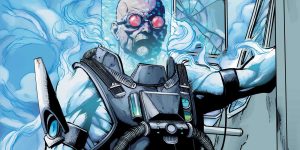Blink-182 spoke the truth when they sang “work sucks, I know.” Working white collar jobs in standard office settings is a drag: fluorescent lighting, business casual clothing, sitting in an office chair for eight hours. This is something that Apple TV+ series Severance deeply understands. The series also knows that sometimes, office drudgery can be made better with a little treat — and what’s a better treat than food?
In the show, now in its second season, employees are “severed” in order to work at the town’s corporate overlord Lumon, a mysterious company run by the omnipresent Eagan family and late founder Kier. The procedure splits people into two consciousnesses — the innies who work at the office and the outies who live in the real world. For innies, who literally haven’t touched grass, food is a big incentive. Throughout the subterranean office halls, there are vending machines with specialty snacks. Workers and teams who hit their quotas can earn food parties.
Dan Erickson, the creator and executive producer of Severance, drew on his experiences working in corporate settings for the show. “I always thought it was interesting how food — which is such a basic human need — gets used to incentivize productivity,” he says. “There’s something especially nefarious about it.” He remembers being of two minds about office food. On one hand, it’s “hey, come on, you condescending bastards, you can’t win me over so easily.” On the other, “I really want that pizza.” Severance takes those dueling emotions and amplifies them in scenes that are more explicitly unnerving.
In the latest episode titled “Trojan’s Horse,” (note: Season 2 spoilers ahead) food is used as an attempt to appease the Macro Data Refining team who are sad and outraged over the forced retirement of their colleague Irving B. (John Turturro). At a perfunctory funeral for the innie worker, supervisor Miss Huang rolls out a carved Black Beauty watermelon bust of Irving, which, yes, was made of a real watermelon, sourced by the show’s prop master Catherine Miller. “The blood-red interior of it, it almost looks like it’s made of flesh,” Erickson says. “It made it that much more disturbing to me. It’s like, Irving’s gone and now we’re eating him. There’s something viscerally upsetting about the whole thing, which I thought juxtaposed nicely with the weird corporate pleasantness that it was being presented in.”
While this is the first time watermelon appears in the office, melons are actually ubiquitous. Lumon’s office parties, from productivity rewards to retirement parties, always center on melons — those omnipresent, often unwanted occupants of the fruit platter. Erickson was inspired by the fruit spreads at his office jobs. “The most common thing was that there were a lot of melons,” he says. “The green one, which, to me, has always been the most flavorless, like you’re eating air.” (BoJack Horseman agrees with him.)
Importantly, none of the food in Severance looks delicious. But even though they’re unappealing, these ostensible “rewards” get results. “For these characters who are in this insular world where they have no access to any food except that which is provided by the company, it becomes this almost Pavlovian thing where you can’t help but be motivated by it,” Erickson explains.
:no_upscale()/cdn.vox-cdn.com/uploads/chorus_asset/file/25873512/Severance_Photo_020406.jpg)
Erickson sees something particularly distressing about the gifting of fruits. “[With] how perishable it is, there’s this weird sense of pressure to eat it,” he says. He recounts that he was sent some fruit for his birthday, and while he’s grateful for the present, it gave him anxiety: “The clock is ticking, you better get on this or it’s going to go bad.”
In the show, Lumon supervisor Seth Milchick (Tramell Tillman) delivers pineapple baskets to the outies as a way of making up for their innies “escaping” to the real world (the outies had no idea what was happening at the time). Yet this fruit — the symbol of hospitality — isn’t purely benevolent. “You’re given a chore because it’s not easy to break into a pineapple,” Erickson says. When Milchick hands off those gifts, “he’s giving a task, and it’s prickly and uncomfortable, but people are supposed to be grateful for it.”
And Lumon’s treats can be taken away as quickly as they are handed out, underlining the company’s control over the meager pleasures available to the workers. During the outdoor retreat in the Season 2 episode “Woe’s Hollow,” the team is presented with a cozy campfire s’mores setup. During the evening, the team starts laughing at a story Milchick intends for them to take seriously, and as punishment the sweets are thrown into the fire. “Marshmallows are for team players,” Milchick says during the scene. “They don’t just hand them out.”
Here, too, the food looks unsettling. The pile of confections each have the face of Lumon founder Kier stamped on them. “It’s literally branded,” Erickson says.
Ultimately, Severance is a show about humanity in the capitalistic world and how to get people to do what you want. And what better tool to use than food? “Food does weird things to us,” Erickson says. “It just does.”
Food is necessary for people to survive, and it’s Lumon’s dangling carrot (to throw in a vegetable metaphor with the fruit). But even when the innie workers are happily rewarded with deviled eggs and flavorless melons, they’re being reminded of who is providing these so-called treats: Praise Kier.








